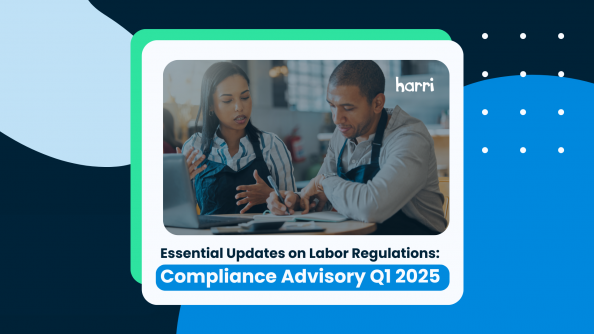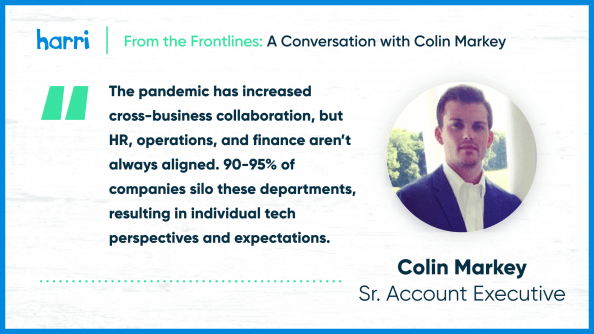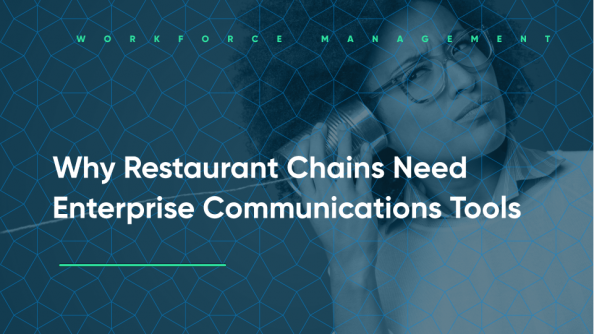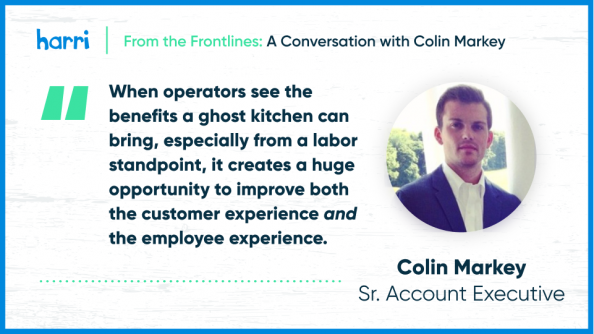Redefining the Employee Experience: Building Sustainable People Operations with Technology
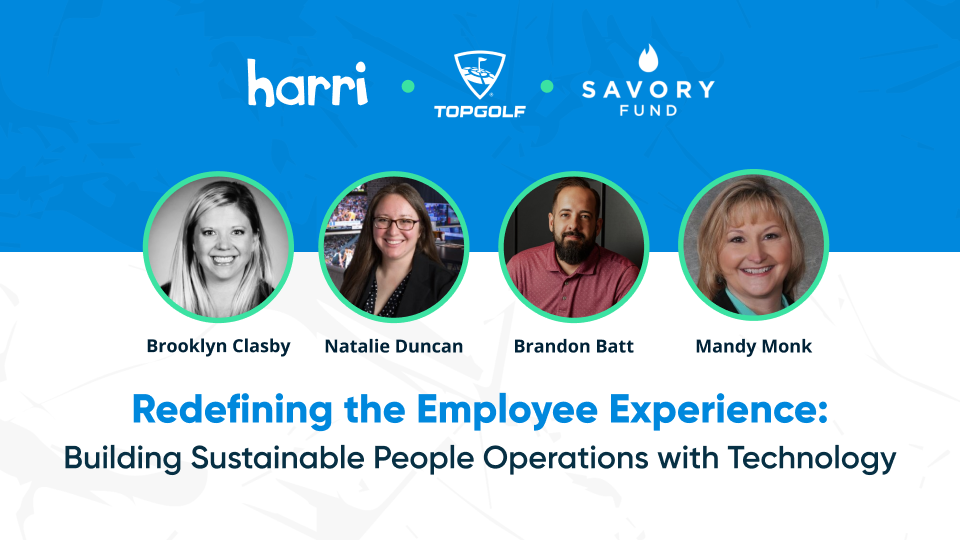
- By Harri Insider Team | June 10, 2021
Brooklyn Clasby, Senior Account Executive at Harri, caught up with Natalie Duncan (Manager of Talent Acquisition Programs at Topgolf), Brandon Batt (Director of People at Savory Management), and Mandy Monk (Executive Director/Chief People Officer at The People Advisers) to discuss hospitality’s employee experience in a second webinar session. Today, the team covers the importance of long-term company culture, creative ways to drive hiring and retention with culture, and how the successful implementation of technology plays a role in these initiatives.
As hospitality navigates a massive post-COVID labor shortage, most brands find themselves in a reactionary position. Not only are brands struggling to hire new people, but also to keep existing talent.
Mandy started the webinar off with strong advice regarding company culture, “People don’t leave for no reason, you need a strong company culture and a strong environment. It’s about driving culture just as much as it is bringing on new talent.”
Brooklyn attributes this to the fact that hospitality is very reactionary from a tech standpoint. Operators want “a hiring solution to solve a niche problem. But you’re going to have the heartburn of turnover if you’re not focusing on your culture now. Focus on the big picture of the employee experience.”
The first 90 days of the employee lifecycle is critical, but it’s also crucial to keep a continued focus on existing teams. When asked how to recruit differently, Mandy’s first question is, “what are you doing with your existing teams?”
Cultural drivers from management to hourly workers
According to Brandon, company culture should be treated as a living organism not just within the brand as a whole, but within each of its individual locations, “Culture is more than a sign or a pre-shift chant. You have to work through it every single day. Culture starts at the general manager and goes down. If a GM isn’t living, coaching, and teaching it, it’s not going to exist very long.”
At Savory Management, their teams embrace the “cliches” of being honest and having a good work ethic, “what sets us apart in our culture is that we live it. Our new employees see it from day one from our managers, our supervisors, and are more tenured staff.”
Mandy notes that hospitality employees are exhausted, with most restaurants operating with reduced staff. Motivating general managers and their teams is critical.
To that point, upper-level Savory Management staff visit locations each and every day, working shoulder-to-shoulder to help service-level employees get through the day. In one of the brand’s concepts, general managers go to locations and take the employees out to do fun things and unwind. They’ll borrow employees from other locations to take an extra shift so different teams get a chance to take that breather. According to Brandon, it fosters teamwork and “creates a sense of ownership down to the hourly employees” when their time comes to cover for a team bonding experience.
Natalie shared Topgolf’s five core values of “Fun, One Team, Excellence, Edgy Spirit, and Caring,” which were dreamed up organically by hourly employees and filtered upwards. The brand utilizes a Facebook-style newsfeed to inspire team members with “a moment that matters” and also dedicates new hire training to culture classes. She notes that “we connect our team members with culture. Training from the get-go makes our culture stronger than ever.”
Pulse surveys: fighting burnout with empathy
As noted earlier by the panelists, technology plays a huge role in company culture, but that tech must be readily adopted. When asked how they know if managers are actually using technology put in place, the panelists had a lot of great insights to add.
Communication and gauging employee sentiment were two major themes. Natalie shared that Topgolf frequently utilizes pulse surveys to understand team concerns and quickly deliver solutions. Short surveys are distributed to all levels of team members to understand gaps and celebrate wins.
Brooklyn followed up with commentary on the new industry reality, noting that “It’s not uncommon to see dining rooms unable to open due to a lack of staff, or to see if you were employees doing quadruple the work they normally would.”
Understanding the human side of burnout and showing empathy goes a long way in terms of retention. Mandy discusses the importance of weaving that empathy and communication within company culture, “does the general manager foster culture in the environment? Retaining materials, birthday celebrations, recognition in shift huddles…different things like that connect. It can’t be a one-time thing, it has to be part of the culture and part of the environment. It’s an ongoing type of thing.”
To sharpen the point on longevity, Mandy explains how a gift from corporate might “make employees feel good at the time, but to sink in it has to connect to their emotions.” That can be done by celebrating life events, giving shoutouts, or even sending personalized birthday cards from managers. “It needs to be done all day, every time.”
Brandon made an excellent point that employees have different levels of comfort and trust with their direct managers, store managers, district managers, and so on. As such, Savory Management conducts pulse checks on all levels to ensure real-time, well-rounded responses.
Ensuring work/life balance with smarter workforce management
Employee engagement and the employee experience as a whole revolve around work/life balance, specifically the schedule.
Brooklyn notes how hospitality “historically hasn’t thought workforce management was truly an important piece of the employee experience until predictive scheduling came along,” which has been identified as a factor to today’s labor shortage.
In fact, according to Mandy the workforce is changing and has a huge impact on the employee experience, “people are going to want more consistency. Predictive scheduling and Fair Workweek are going to become even more popular as we move forward.”
She notes how technology must support those efforts because, “when you have a system that doesn’t work well for you, it becomes a very manual process. If you think about your managers: do you want them to spend time focused on collecting notes manually? Or do you want the system to support you in looking after the overall aspects of your business?”
If you think this isn’t top of mind for today’s workforce, think again. Brandon shared tht Savory Management researchers employee sentiment regarding various aspects of the employee experience, and found that flexible scheduling tends to fall within the top 5 pieces of importance.
Workforce management technology impacts the employee experience in this way but also considering the skills of your employees, or from a scheduling standpoint, sharing employees from different locations to accommodate labor gaps. Mandy tells us that “most companies don’t optimize or take that next step to consider how to we make [tech-based operational processes] work for our people.”
Successful tech adoption will continue to drive culture
According to Brooklyn, when you have managers in multiple places using multiple tools, using technology to unify those operations and create a great employee experience is crucial. It can also help with operational innovations like Uber-like scheduling, which is becoming critical to hiring and retention efforts.
The panelists agreed that taking a crawl, walk, run approach to technology adoption and implementation is ideal. “You can have the finest tech in the world,” said Brandon, “but if it’s not adopted at the group level, where it matters, then it’s basically an expensive Excel sheet.”
But how can hospitality brands ensure successful adoption? Natalie suggests finding a member for the team who “knows the tech piece so well but can also be in the weed with operators so they know how it impacts their life and optimizes it accordingly.” She points out how most operators currently create manual processes for themselves by using many different pieces of technology that don’t talk to one another.
“Looking at technology holistically is important,” notes Brooklyn, “even in a reactive moment.”
Another important element to consider is to avoid losing the human aspect of technology. Brandon makes a good example of how it’s easy to get lazy when you have an amazing piece of technology, “ you find that managers aren’t having conversations with their employees regarding their schedules. They’re letting the tech do it all when really they should be having a conversation around availability.”
In closing, Mandy adds that smooth tech adoption is crucial to the employee experience, “we have to impress our team or we’ll lose them. Technology should support the business and the team”
Watch the full webinar here.
Watch the panel’s first session here.







